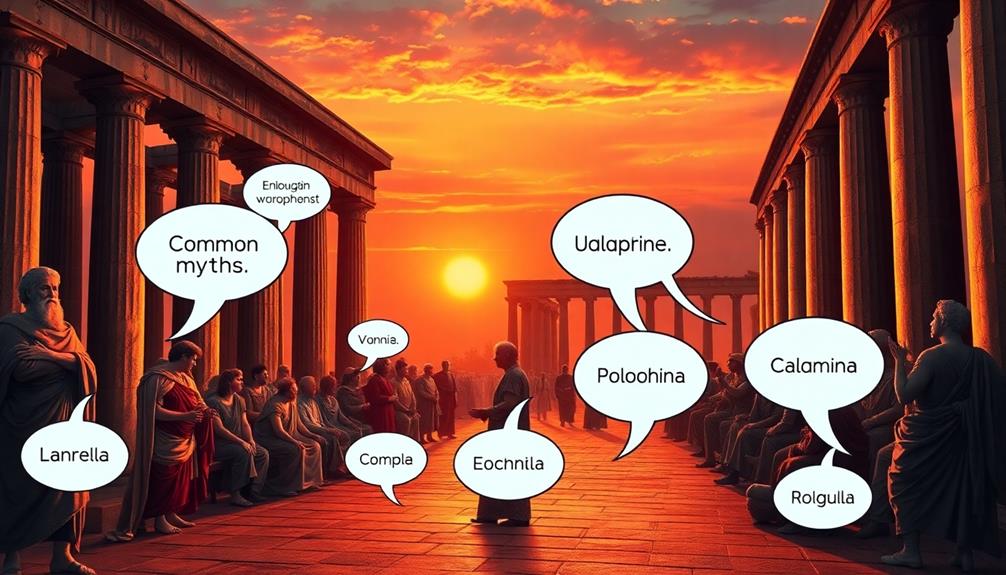The debate between the Sophists and Socrates changed the course of Western thought by challenging the nature of truth and ethics. Sophists argued that truth is subjective, while Socrates emphasized the importance of questioning and ethical inquiry. This clash introduced concepts like moral absolutism versus relativism, paving the way for modern epistemology. Their discussions laid the foundation for critical thinking and self-examination, influencing education and personal ethics today. Understanding this pivotal philosophical shift can deepen your appreciation for how these ideas shape contemporary views on knowledge and morality—there's much more to uncover about this fascinating transformation.
Key Takeaways
- The Sophists introduced the idea of subjective truth, challenging absolute notions of morality and reality in Western thought.
- Socratic philosophy emphasized ethical inquiry and the importance of self-examination through dialogue, shaping modern philosophical discourse.
- The clash between Rationalism and Empiricism laid the foundation for contemporary epistemology, influencing how knowledge is understood and acquired.
- Hegel's dialectical method highlighted the evolution of self-consciousness and historical reasoning, impacting philosophical interpretations of truth and reality.
- The legacy of Socratic thought promotes critical thinking and reflective dialogue, crucial for personal growth and societal progress in education.
The Sophists: Advocates of Subjectivity
The Sophists, influential figures in fifth-century Athens, championed the idea that truth isn't an absolute but rather a subjective construct shaped by individual experiences. Their emphasis on personal perception aligns with the importance of mental clarity and health, which suggests that understanding one's own thoughts and feelings can lead to a more nuanced grasp of truth.
You might find their approach intriguing, especially through the lens of Protagoras, who asserted, "Man is the measure of all things." This perspective emphasizes that each person's understanding of truth varies based on personal perception. Gorgias, another key Sophist, took this a step further with his radical skepticism, questioning whether objective reality even exists and highlighting how language influences our grasp of the world.
Their contributions to rhetoric were significant, teaching the art of persuasive argumentation that became essential in public discourse. By focusing on relativism, the Sophists challenged traditional views of absolute truth and morality, inviting you to reflect on how knowledge is contingent on human experience.
This revolutionary stance laid the groundwork for critical thinking, encouraging you to engage in deeper examination of ethical and political issues. As you explore Western philosophy, you'll notice the profound impact the Sophists had on shaping debates about truth, ethics, and the nature of knowledge, ultimately fostering a culture of inquiry and skepticism that continues to resonate today.
Socratic Method and Ethical Inquiry

Socrates' approach to ethical inquiry revolutionized philosophical thought by emphasizing the importance of dialogue in uncovering truth. His Socratic Method encourages you to engage in cooperative argumentative dialogue, stimulating critical thinking and drawing out your underlying assumptions.
Through this process, Socrates challenged you to redefine complex concepts such as justice and virtue, a practice that mirrors the principles of emotional intelligence in workplace dynamics.
Here are three key aspects of the Socratic Method that enhance ethical inquiry:
- Questioning Assumptions: Socrates often used irony and paradox to make you re-evaluate your beliefs, confronting you with your own ignorance.
- Defining Ethical Concepts: He believed that understanding justice and virtue required dialogue rather than blindly accepting societal norms.
- Encouraging Reflective Thought: By engaging in this method, you're prompted to examine your life and choices, aligning with Socrates' assertion that "the unexamined life isn't worth living."
The legacy of the Socratic Method continues to influence modern education, particularly in law and philosophy, fostering a culture of critical analysis and reflective thought.
This profound shift in ethical inquiry paved the way for subsequent philosophical discussions, shaping the course of Western thought.
Clash of Philosophical Ideologies
Throughout history, various philosophical ideologies have collided, sparking debates that shaped our understanding of knowledge, ethics, and existence. The clash between Rationalism, led by thinkers like Descartes and Spinoza, and Empiricism, represented by Locke and Hume, fundamentally influenced modern epistemology.
While Rationalism posits that reason is the primary source of knowledge, Empiricism argues that sensory experience is paramount. This debate mirrors the importance of open communication in relationships, as both require a willingness to engage with differing perspectives to foster understanding and resolution.
Additionally, establishing common goals in philosophical inquiry can be likened to trust-building activities that strengthen relationships.
In the domain of ethics, Socratic philosophy emphasizes self-examination and moral absolutism, standing in stark contrast to Sophist thought, which embraces moral relativism. This tension illustrates a fundamental struggle between differing views of truth.
Hegel's dialectical method aimed to reconcile contradictions, while existentialists like Kierkegaard and Nietzsche highlighted the absurdity of individual experience.
Further complicating ethical discourse, Utilitarianism, championed by John Stuart Mill, seeks the greatest good for the greatest number, opposing Kant's Deontological ethics, which prioritizes duty and intention.
The rise of Postmodernism challenges the Enlightenment ideals of objective knowledge and absolute truths, marking a significant shift in contemporary thought. These clashes of ideologies continue to provoke critical discussions, shaping how we view morality and existence today.
Impact on Western Thought

Philosophical debates have profoundly shaped Western thought, influencing how people understand knowledge, ethics, and reality. The clash between Rationalism and Empiricism laid the groundwork for modern epistemology, with thinkers like Descartes, Locke, and Hume exploring the origins of knowledge.
Kant's transcendental idealism reconciled these perspectives, asserting that both sensory experiences and innate concepts shape human understanding. This transformative approach is echoed in contemporary discussions on personal development, as seen in books like Positive Thinking Day, which emphasizes actionable strategies for personal transformation.
Key impacts on Western thought include:
- Self-Consciousness Development: Hegel's dialectical method emphasized the evolution of self-consciousness, encouraging a historical approach to reason.
- Subjective Interpretation: Existentialism, led by figures like Kierkegaard and Nietzsche, challenged objective truth, placing individual experience at the forefront of moral considerations.
- Pragmatic Focus: The rise of Pragmatism shifted the discourse towards practical consequences, urging a reevaluation of truth based on lived experiences.
These philosophical movements have profoundly influenced contemporary views, encouraging a more subjective interpretation of knowledge and truth. By engaging with these debates, you can better appreciate how they shape not only academic discussions but also everyday moral and political thought in your life.
Legacy of Socratic Philosophy

The legacy of Socratic philosophy profoundly influences how we think about ethics and critical inquiry today. By employing the Socratic method, which promotes dialogue and critical thinking through questioning, Socrates emphasized the importance of ethics and virtue. His assertion that "the unexamined life isn't worth living" laid the groundwork for numerous ethical theories, encouraging you to prioritize self-knowledge in your pursuit of truth.
In personal relationships, for instance, recognizing the need for self-reflection can lead to healthier dynamics and personal growth, as maneuvering emotional entanglements often requires clarity and understanding of one's own values and boundaries recognizing signs of stagnation.
Socrates' unwavering commitment to his principles, even in the face of his trial and execution in 399 BCE, serves as a powerful proof of the value of philosophical inquiry. His thoughts notably shaped Plato, who documented Socratic dialogues and set the stage for Western philosophy, particularly in areas like epistemology and metaphysics.
Today, the legacy of Socratic philosophy is evident in modern education systems, where the emphasis on critical thinking and reflective dialogue remains essential. Engaging in discussions and questioning assumptions not only enriches your understanding but also fosters personal and societal growth.
As you explore these ideas, remember that the pursuit of ethics, virtue, and self-knowledge is an ongoing journey informed by Socratic thought.
Frequently Asked Questions
Who Were the Key Figures Among the Sophists Besides Protagoras?
Besides Protagoras, key figures among the sophists include Gorgias, known for his rhetoric, and Hippias, who was a polymath. You'd find their contributions shaped the landscape of ancient Greek philosophy and education considerably.
How Did Socrates' Approach Differ From That of the Sophists?
Did you know that 70% of students believe critical thinking is essential? Unlike the sophists, Socrates emphasized seeking truth through dialogue and introspection, rather than merely persuading others with rhetoric and subjective opinions.
What Were the Main Criticisms of Sophist Thought?
You'll find that the main criticisms of sophist thought include their emphasis on relative truth, lack of genuine knowledge, and prioritizing persuasion over morality, which Socrates believed undermined the pursuit of true wisdom and ethical understanding.
How Did Socratic Philosophy Influence Later Philosophers Like Plato?
Socratic philosophy shapes your understanding by emphasizing critical thinking and ethical inquiry. It inspires Plato to explore ideals and forms, leading you to appreciate the foundations of Western philosophy that challenge assumptions and seek deeper truths.
What Role Did Athenian Democracy Play in This Philosophical Debate?
Imagine scrolling through social media debates; Athenian democracy fostered open dialogue, allowing diverse ideas to thrive. It encouraged questioning and critical thought, shaping philosophers' perspectives and inspiring future generations to engage in their own intellectual discussions.
Conclusion
In exploring the clash between the Sophists and Socrates, you uncover a transformative moment in Western thought. The Sophists championed subjective truth, while Socrates pushed for objective reality through rigorous questioning. This philosophical tug-of-war not only reshaped ethics and knowledge but also laid the groundwork for future thinkers. Ultimately, the quest for truth remains an enduring legacy, inspiring you to seek clarity and understanding in your own life and beliefs.









